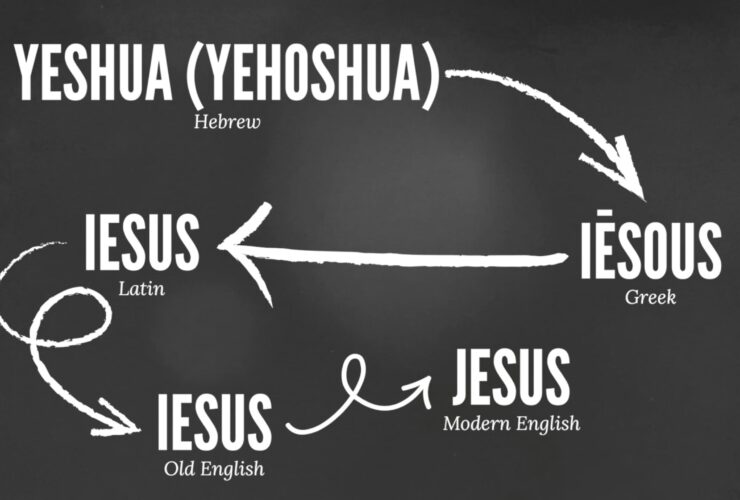The exploits of Deuteronomy and conquest of Joshua no doubt raise a few eyebrows for newcomers to the faith, doubters, cynics, and even longtime Christians, where accusations and questions of God’s moral character abound. Underneath these accounts of bloodshed, there is at first glance, a deep-seated conflict between God’s wrath and justice of the Old Testament and God’s all-loving and merciful nature in the New Testament. Abusing this tension of God’s wrath and love is not new, however; so much so that many so-called Christians today are willing to throw out the OT or commit gnostic heresies by pitting Father against Son, as if the God of the Old is different from the God of the New. Others simply skip over this section entirely for its all too barbaric, gruesome subject matter, likening the account to ethnic cleansing, Israeli propaganda, ungodliness, or what have you. Perhaps you have heard grumblings, ‘God is an egomaniac! A moral monster! How can God be good if He’s a racist bigot who condones genocide?’ An emotionally loaded accusation, masked as a question, is hardly ammunition–––it’s mudslinging. Designed to trigger a kneejerk reaction for the less theologically inclined, either to brazenly push a Christian closer to the edge of atheism or to polarize their view of God’s character, dangling their faith between skepticism and contempt: God is a hypocrite, unworthy of your worship and belief. And so, seizing the opportunity, they get a foot in the door–––no need to pry it open.
But it is not solely God’s wrath on human evil that makes people take a step back, it’s the fact that, in this instance specifically, God strongarms humans to do His bidding; or that’s how the picture is framed, at least. He delivers Israel from slavery and then sends them to Canaan, not as gracious missionaries but as a tool of His judgment. Charged with immorality and idolatry, God orders Israel to “completely destroy” the Canaanites–––children included (Deuteronomy 2:34-35, 3:6; 13:15; 20:16-18; Joshua 11:14). In the case of Sodom and Gomorrah however, God assumes His natural responsibility we all intuitively understand as the sole authority over life and death, the only one wholly sovereign and deserving to make life or take it. God utterly destroys every living thing in the sister cities by fire and brimstone for similar, if not, the same immoral and idolatrous reasons as Canaan (Genesis 19:24; cf. Jasher 18-19). Again, God’s judgment against heinous depravity and unspeakable evil indulged by these cultures is not so bothersome, here, even though God’s judgment would, no doubt, include children. People usually desire for God to intervene against evil. It is the usual gripe against God if I’m not mistaken–––that He does not intervene against evil enough! The emotional tension with the conquest, then, is narrow: Why would God use people to kill other people? Why not do it Himself? Especially to such a degree as not to show mercy to “infants and nursing babies” (1 Samuel 15:3) who have “no knowledge of good or evil” (Deuteronomy 1:39). It’s the children that get us, I know that much is true; considering adults have made the bed they sleep in, but children are innocent, teeming with potential, and sleep in the bed made for them. And yet, God makes specific claims about His moral character throughout the Bible that seem to conflict with this order: God is love, goodness, and justice (Mark 10:18; 1 John 4:8; 3 John 1:11); God is the defender of the fatherless, widow, and weak (Psalm 68:5, 82:3-4); God is truth and cannot lie (Numbers 23:19; Titus 1:2; John 14:6; Hebrews 6:18). How do we, as Christians, reconcile all this?
“For our struggle is not against flesh and blood, but against the rulers, against the authorities, against the powers of this dark world and against the spiritual forces of evil in the heavenly realms.”
Ephesians 6:12
Understanding the moral character of God is a hot subject in theology today, given the enormous amounts of criticism against the faith. Theologians call this theodicy, which attempts to reconcile, vindicate, or explain God’s moral perfection and divine providence in the face of evil, however great or small the dilemma. Now I’ve brought several things to attention, perhaps too many things, but I wish to address each one as best I can. Resolve to this emotional and moral tension lies in a deeper understanding of theology, not just in intellectual sufficiency or philosophical argumentation, but in the spiritual grasp of moral necessity.
Theodicy or Anthropodicy? On God’s Goodness.
Before someone even thinks about putting God in the proverbial hotseat––though I advise you never do––one must first take the plank out of their own eye to avoid unnecessary splinters: Is mankind in a position to charge God with immorality? In other words, is humanity inherently good to assume the moral high ground above God?
For sake of argument, presume atheism is the correct worldview for a moment, that God is not real but some imagined ideal. Does that not mean humanity (not God) is the source and cause for such horrific feats depicted in the conquest? Furthermore, if the argument is that God is nothing but an unhinged toddler who always wants His way – immoral, irrational, narcissistic – what, then, does that say about human idealism? Is it not the human imagination conjuring up self-admiring evils while committing these heinous crimes against humanity in the name of a make belief God? All this does is shift the problem from God to man, which sounds strikingly Biblical, considering one of its central themes is the universality of sin. You could say the desire to blame God for evil hits the mark!
But the moral problem only gets worse from here. If God does not exist, there is no moral truth, and no way to differentiate good from evil. We are left with a contract between people as the highest source of moral accountability, with no actual moral value intrinsic to human wellbeing to determine if, say, killing is wrong–––what we agree on is good. This fact is well known among Christian philosophers and theologians, though unpopular among cynics. What has been shown time and time again is that when God is illusory, morality ends up becoming a cultural phenomenon, a composite of ideal mutual beliefs, attitudes, and behaviours instituted by contract or force, by popular majority or elite rule. And if morality is cultural and subjective in nature, not objective or true, what is inherently wrong with killing the Canaanites? Killing, murder, and genocide is not objectively wrong, it’s just not ideal, subjectively speaking from our cultural standards today. Why so? Because, simply put, there is no moral truth.
When you discredit God’s constitution and moral character, you end up defending moral relativism, which is a subjective way to say immorality. You can’t have your cake and eat it, too. When you assume God does not exist, you cannot assume morality exists––we as humans do not have an inherent objective moral basis to charge God with immorality, not in nature or biology, not in physics or psychology. We all have a sense of what’s right (a conscience bestowed by God), but we are not obligated to do what’s right, nor are we forbidden to do what’s wrong, especially when God is presumed dead. And, if evil is a human problem without clear restraint, then all we ought to do is ask ourselves: How well have we done so far without God? The bloody atheist regimes of the twentieth century speak for themselves–––Stalin, Hitler, Mao, Pol Pot. It is because of their brutal, inhumane immorality does the word “genocide” even exist! Least of all the onslaught of average citizens willing to follow direct orders from the dictators of the highest contract to save their own skin. God obliges you to love your neighbour, enemies included, at the risk of death, and atheist regimes demand you to murder your neighbour, friends included, or else you’ll die.
Hm. What a moral conundrum! I wonder who’s right?
When there is no transcendent moral accountability – that is by an all-good supreme Being – morality is nothing but a subjective, private opinion. Why not do whatever it takes to survive? If such is the case, then Joshua and the Israelites are vindicated by a lack of actual morality. We are in no position to judge God. But we are in position to charge man by all accounts.
Genocide or Justified? On God’s Justice and Mercy.
We all know humans have killed for lesser reasons than God’s, and the account given against Canaanites is staggering – sacrificing children to demons, burning people alive, cult prostitution, all kinds of sexual immorality, worshipping evil, wicked perversion, lying, swindling, altogether ruthless (Deuteronomy 7:5, 12:2-3, 12:31, 32:17; Joshua 6:26). In fact, the archaeological data arguably paints a more wicked picture of Canaan than the Bible, which is a testament to its real-world applicability. Rather than destroy them right away, God patiently waits 400 years for them to repent since “the sin of the Amorites has not yet reached its full measure” (Genesis 15:13-16), and they don’t. Let’s not confuse patience for injustice, that God mercifully endures evil so that all can come to repentance (2 Peter 3:9), wherein there is mercy, life, and restoration. So, due to their moral depravity and lack of repentance, objective moral judgment was coming. And according to Rahab, they all knew it! (Joshua 2:8-11)
Rahab says that the people of Jericho’s “hearts melted in fear and everyone’s courage failed” because Israel’s God freed them from slavery, dried up the Red Sea, destroyed the Egyptians, decimated the two Amorite kings, and that they knew judgment was coming against them by this same all-powerful God of “heaven above and earth below”. And yet, they refused to repent and leave (keep in mind; these cultures were not naturalistic, they deeply believed in the supernatural). The people of Jericho could have spared their woman and children by repenting, but they chose to fight against God to preserve their filthy culture of injustice and bloodlust. That is not on God, that’s on them. They had a choice, as God tells the prophet Ezekiel:
“Say to them, ‘As surely as I live, declares the Sovereign LORD, I take no pleasure in the death of the wicked, but rather that they turn from their ways and live. Turn! Turn from your evil ways! Why will you die, people of Israel?’” (Ezekiel 33:11)
Furthermore, God was driving the Hivites, Hittites, and other Canaanites tribes out of the land before Israel went in to take it, causing panic and confusion so that they would flee; meaning, that people were already leaving the land before God’s full sweeping judgment came because of God (Exodus 23:27-30; Leviticus 18:24; Numbers 33:52). God also told Israel to offer peace treaties to select cities that were willing to repent, and only committed complete destruction to those that would not repent, which some scholars consider to be fortress cities and military outposts rather than civilian-run villages (Deuteronomy 20:10-11). The point is: It was a targeted judgment against evil. Finally, God also waited 40 years before engaging Canaan in the wilderness wandering, giving them ample time to repent. If so, they could have just left and avoided war altogether, sparing their children if they so cared, since they knew the Hebrews were coming back to claim their land under God’s provision. God gave them ample time and opportunity to turn from evil or just leave[1].
With all that in mind, some of you may start to wonder: How do we know for sure repentance would appease God’s wrath? Well, there’s biblical evidence for it. Jonah preaches repentance to Nineveh, who were also engaged in abominable evils like Canaan, arguably even worse. Nineveh repents, and so God spares them (Jonah 3:10). Likewise, Jericho and other Canaanite cities knew judgment was coming by a wave of destruction, and everyone intuitively knows how to plea for mercy––all they had to do was repent. And to those who did abandon their evil ways, such as Rahab and her family, they were spared. Again, this is not a “systematic cleansing or extermination of an entire ethnic group or race” that the definition of genocide demands, it was a targeted moral and spiritual judgment against the horrific atrocities committed by the people groups living in Canaan.
This was an act of God’s justice, not injustice.

Preferential or Impartial? On God’s Judgment.
In the conquest, then, the only thing God is guilty of, so to speak, is revealing to a people that He is using them to judge wickedness, that He is the one who gives victory or defeat, who gives life or takes it. God is still in charge of making or taking life, so whether that judgment is by natural disaster, or the hands of men, is of little consequence when it comes to God’s moral judgment because God is the basis of morality, the judge of good and evil, the author of life, and the sole authority to forgive sin.
For instance, say God did not reveal to Joshua and the Israelites that He was with them, it would not change the fact that God still used them as a tool of judgment. After all, to further intensify God’s impartiality, God uses Gentile nations – Babylon, Persia, Greece, Rome – as a tool of judgment against Israel 500 years later, unbeknown to the pagan kings and priests[2], even though God warned Israel not to become like them lest they too would be “devoted to destruction” (Deuteronomy 29:25-28; Joshua 6:18, 7:12; cf. Numbers 33:55-56), comparing their swift destruction to the likes of Sodom and Gomorrah (Deuteronomy 29:19-24; Isaiah 1:9-10, 2:9).[3] God even forewarns Israel not to think so highly of themselves because they don’t morally deserve the land their inheriting, so that they can avoid this same type of judgment, and yet they still fail to heed His warning (Deuteronomy 9:4-6). If this is Israeli propaganda, it’s the most uninspiring call to nationalism I’ve ever seen.
God is good, and so a good God judges evil. How can we hold God culpable for injustice just because He revealed His plans to a nation in which He also uses to save the world through Messiah? We pat ourselves on the back for defeating the Nazis, but God forbid He tells us to do it! Would we be better off if He had said nothing at all? And funny enough, isn’t that yet another usual gripe against God, that He is inactive, impotent, and voiceless? And yet, for whatever reason, deism is looked upon more favourably in our culture than theism. We accuse God of being indifferent to our troubles out of one side of our mouth and then desire Him not to be personal out of the other. We scorn God for being hidden and invisible in earthly affairs, and then, when He is active and visible, such as when He judges evil, we accuse Him of being an immoral monster. You can’t win for trying! Since God is the source of justice, truth, righteousness, goodness, love, and law – which is what Christians believe – why, then, is it wrong if He proves that He’s in control for our own good?
You strive against God, you desire evil. It’s a spiritual declaration of war against goodness. Plain and simple. In Christianity: God is good, people are evil. (Matthew 7:11) This is one of the foundational themes of the whole Bible. Humans are not good without God. We are corrupt, selfish, manipulative, liars–––our hearts are deceitfully wicked (Jeremiah 17:9). That is, we are all born into sin and a fallen world. That does not mean beyond redemption, it just means we are all blemished, stained, torn, broken, sick, or what have you. Having fallen, we are not whole by nature, yet we retain a hazy sense of what wholeness is like as God’s image bearers. That’s the crux of the issue, here. Humans inherently feel like they could be good based on their own merit, if given the appropriate means and opportunity for good motives to flourish in their lives. But that is not the picture of human nature being painted here in the text, nor do I see how that view is justifiable given that the poorest and wealthiest nations in the world today, however civilized the pretense, are guilty of the greatest massacres and genocides in human history, whether that was Nazi Germany, Soviet Union, Communist China, or Rwanda. We implicitly lust after an array of evil passions, appetites, desires, and powers, however subtle or grandiose these proclivities might be. Even Israel falls into deep sin in what feels like every other chapter in Exodus, Numbers, and Deuteronomy. Don’t even get me started on Judges. No one is truly good. In our fallen condition, it is now natural for us to be evil–––it’s a moral fact. And yet, we somehow intuitively recognize this fact when we have a visceral reaction to morally reprehensible acts of evil, such as genocide, slavery, sex trafficking, child pornography rings, and the like; we are not appealing to a greater consensus, or merely expressing preferences, but are experiencing an actual emotional repulsion and moral objection to such horrific deeds. We desire justice! We desire law and intrinsic human rights! We desire what’s morally objective; what ought to be done about it. In doing, we appeal to moral truth.
Why Would God Order the Killing of Children?
That said, God still ordered the Israelite military to kill children. How can God order such a command and expect humans to carry it out? It seems to me that this is the most difficult subject to reconcile. Not so much that God would allow children to be killed––this fact has happened since the Fall––but that He would order people to do it. Why would God order Israel to mercilessly kill children, “infants and nursing babies” (1 Samuel 15:3) who have “no knowledge of good or evil” (Deuteronomy 1:39)?
First, as I stated above, God is only ordering this command for select peoples. It was not a universal command or practice to slaughter children and infants in war (cf. Deuteronomy 20:14). God does not judge all nations in this manner, but only the select ones He knew have “reached its full measure” and would not repent. In these select accounts of judgment where God specifically orders Israel to “show them no mercy”, what we may forget (having been raised in the fleeting aroma of a theocentric moral society of our own), is that God’s command heavily implies that it is only natural and normative for people raised in a theocentric society to show mercy (Deuteronomy 7:2; Joshua 11:20), in stark contrast to the surrounding pagan cultures who did not serve God and who also did not show mercy to other cultures or foreign children or even their own children for reasons stated above, whether as sex slaves, burnt sacrifices for power or fortune, or whatever proverbial lot you pulled in life. If the parents of Jericho cared about their children at all, they would not be committing themselves to such heinous crimes. They could have spared their children by repenting! God’s utter judgment is a dire warning for us: Do not embrace evil. One that we have not heeded.
Either way, the main point, here, is that God was judging the people completely––utterly––for their wicked ways. This is not what God wanted to do (2 Peter 3:9). This is what God had to do. And as a divine irony would have it, the children who were spared from being a burnt sacrifice, based on their own subjective moral standards, were now the ones who would perish by the sword. God was completely judging their decisions and spiritually corrupt hearts, as difficult as His justice might be to swallow. Israel was carrying out God’s judgment, not their own peculiar sense of justice. It was not their will or desire to kill children. The Israelites were acting on behalf of God, putting each soul slain into His hands. So, the Israelites could have some sense of solace knowing that it was God’s will, knowing fullwell that God is in control of their souls.
Consider God’s perspective for a moment; God has permitted children to pass away every single day since the Fall. Likewise, if God were to destroy Canaan like He did Sodom and Gomorrah, the children would not be spared, either. It’s an inescapable fact. And yet, He promises us that He will personally resurrect and judge each person and nation, and child, come Judgment Day. The conquest is only a partial divine judgment and foreshadows an even greater eternal judgment of the whole world at the end of all things. And on that note, there is also biblical evidence to support that children killed in the conquest may be saved, having not reached the age of accountability (that is, since they do not know good from evil, the child is not held morally culpable for their parent’s immorality). Though admittedly, this is not a universally concrete doctrine, so I cannot say with certainty that this will happen. God is the judge, not me. But what I am certain about is that my moral judgment is corrupted, but God is good, just, merciful, and loving. God will always make the right judgment call, that much we are assured of. He also promises that our sinful condition is only temporary, and that it will soon be over so long as we trust in Him.
“God shall wipe away all tears from their eyes; and there shall be no more death, neither sorrow, nor crying, neither shall there be any more pain: for the former things are passed away.” (Revelation 21:4)
On the Death of Children.
With emotions running higher each day as wars around the world escalate, say, in Russia-Ukraine War or in Israel-Gaza, the death of children has been thrown to the forefront. It’s unspeakable heartbreak to watch little children be killed. It’s a pain that runs so deep, that it only draws on deeper questions to find some temporal satisfaction. I encourage you to read: Q6. Why does God work with Satan? But to be honest, there is no actual resolve or emotionally satisfying answer when it comes to the death of children, and I think that’s the point–––there can’t be. Death never brings satisfaction. That is why Christ came, to save us from death. Come that Day when Christ raises the dead for judgment and redeems the world, then and only then will every tear be wiped away and will those who desired truth and truly repented see their children again.
While these counterarguments may help to some avail, I understand that it does not completely offset the moral and emotional tension that comes with the account. The spiritual weight of God’s plan will ease the burden and keep you grounded, but the pain of losing a child will not completely go away until the day of salvation when you see your child again.
Atheism, on the other hand, will not help you in this regard, it will only harden you. Again, to live in a moral world without God doesn’t work. The only reason we feel this way about the loss of children is because we have an actual sense of objective morality. So, ironically, we need objective morality in God to believe, feel, and know killing children is wrong, and yet other cultures that do not know God were (and are) willing to burn their children on the altar of self-preservation or spiritual power. In fact, full-term infants and children are killed regularly in abortion clinics–––our all-too civilized secular society built a whole industry around killing babies only minutes from being nursed. And we cannot stomach the conquest?! Everyone hates the Bible for “condoning genocide”, but God forbid you cancel my Olympic games. The anti-theistic Communist Party of China hosted the 2022 Olympic Games in Beijing while committing genocide at the same time and everyone tuned in–––no one protested. But God is the problem.
Final Remarks
All that said and done, the spiritual reality behind this account cannot be underscored enough, and I personally have not stressed it enough. A lot of the concerns fade away with a deeper understanding of the spiritual war against the demons and gods underpinning the physical conquest. Too much to say, and too little space. Suffice to say, this judgment took place before Christ’s redeeming power and the inner work of the Holy Spirit. In other words, without the transformative power of the Spirit, the powers of darkness reigned over the hearts and minds of those who worshipped them (Romans 1:18-25). This only intensifies the need for Christ and our vocation to spiritual warfare “against the authorities, against the powers of this dark world and against the spiritual forces of evil in the heavenly realms” (Ephesians 6:10-20).
The problem, again, is that we are too often guilty of judging God by human standards (Isaiah 55:8-9). There is a greater plan at work for all people in the redeeming power of Christ. Amen.

Matlock Bobechko is the Chief Operating/Creative Officer of Bible Discovery. He is an eclectic Christian thinker and writer, award-winning screenwriter and short filmmaker. He writes a blog on theology, apologetics, and philosophy called Meet Me at the Oak. He is also an Elder at his local church.
[1] And it seems that God and Israel did drive many of them out because many of the Canaanite people groups were still alive and well during the time of the judges. So much so that they become a snare to Israel because they did not drive them all out, in which God says, “So now I say, I will not drive them out before you, but they shall become thorns in your sides, and their gods shall be a snare to you” (Judges 2:3). This is a spiritual battle as much as it is physical.
[2] Though known to Isaiah and revealed to Cyrus at his arrival as a testimony of God’s sovereignty (Isaiah 45:1).
[3] God is sovereign over all nations. God uses nations to judge other nations without them even knowing about it. So, at bottom, what troubles some of us so deeply, is the means by which God judges evil nations, even if divine judgment was deserved. But if humans are evil and our hearts are deceitfully wicked (Jeremiah 17:9), then God simply used a lesser evil to judge a greater evil. What right does the clay have to judge the Potter? Especially when the Potter also promises to remold the clay into a greater good, if you follow Him, of course. I understand that that is not an emotionally satisfying answer, but it is a rational one.
• Craig, William Lane. “Did God Commit Atrocities in the Old Testament?” Reasonable Faith. March 3, 2008.
https://www.reasonablefaith.org/media/reasonable-faith-podcast/did-god-commit-atrocities-in-the-old-testament
• Craig, William Lane. “#16 Slaughter of the Canaanites”. Reasonable Faith. August 6, 2007.
https://www.reasonablefaith.org/writings/question-answer/slaughter-of-the-canaanites
• Jones, Clay. Why Does God Allow Evil? Compelling Answers for Life’s Toughest Questions. Eugene, Oregon: Harvest House Publishers, 2017.
• Plantinga, Alvin. God, Freedom and Evil. Grand Rapids, Michigan: Win. B. Eerdmans Publishing Company, 1974.
• Wright, N.T. Evil and the Justice of God. Downers Grove, Illinois: InterVarsity Press, 2006.






